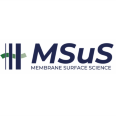The Department of Membrane Science and Technology (MST) links fundamental research regarding membrane materials and their transport characteristics to membrane processes and relevant application areas.
Membrane Science and Technology (MST)
In the sustainable chemistry of the future, membranes will make a difference: they allow gases and liquids to be separated in a low-energy, efficient way, while generating much smaller waste streams. Membrane technology contributes to cleaner water and sustainable energy production. Membranes have to meet strict requirements, and the development of tailor-made solutions requires not only knowledge of membrane materials but also of their possible application areas.
Working together
The strength of the Department of Membrane Science and Technology lies in the long, rich tradition of research in this area at the University of Twente and in the close cooperation between about 60 researchers from a variety of different, but synergistic scientific disciplines. This gives our department a solid knowledge of the entire chain: from the fundamental basics to the technology required to construct these membranes, and to the design of industrial applications.
Thanks to our expertise and high-quality facilities, research groups from all over the world, small and medium-sized businesses, and leading high-tech companies such as Oasen, Shell and Philips are keen to work closely with us. Our department contributes to the excellent, multidisciplinary research within scientific institutes such as MESA+, which is one of the worlds leading research institutes for nanotechnology. The Department of Membrane Science and Technology is also a partner in Wetsus, the centre of excellence for sustainable water technology, and in the Institute for Sustainable Process Technology (ISPT). Our activities have generated a number of spin-off companies, including X-Flow, NX Filtration and Convergence. Our knowledge also finds its way to market through the European Membrane Institute (EMI Twente) at the University of Twente.
Who we are and what we do
The Department of Membrane Science & Technology unites a large variety of excellent scientists, inspiring teachers and talented students who each make their own contribution. In this way, we think our department can make a relevant contribution to the fundamentals of membrane materials and transport properties to thorough knowledge of application areas, for tailor-made development of membranes and membrane processes. The results are evident in our numerous publications as well as in various high-profile achievements.
Our research groups
The Department of Membrane Science & Technology consists of various diverse, but synergetic, scientific disciplines. Within our department, all disciplines are present to:
- develop and characterize (novel) membrane materials, and modify membranes (MSuS, FiF);
- study (interfacial) phenomena and processes that are relevant for mass and heat transport (SFI);
- design novel and optimize existing (separation) processes by employing membranes (MPT).
Contract Research
EMI Twente conducts contract research for industrial clients, brings the practical implementation of an idea a step closer, and helps you bridging the gap between science and industry.
Our engagement in education
Based on our disciplinary strength and scientific excellence, our department engages in various initiatives, programs and projects in both teaching and research. In fact, education is one of our core tasks. Our people play a strong role in the Chemical Science & Engineering curriculum.






